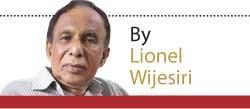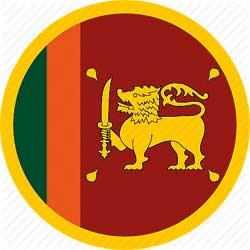Reply To:
Name - Reply Comment
There are, at present, no threats to Sri Lankan sovereignty in any part of our boundaries; at least, not in the traditional way that “threat” has been defined for most of recent history. Why then are some Sri Lankans, including Opposition politicians and some Buddhist priests so focused on the notion of “sovereignty”? Why has so much been spoken and written about it? What are these “threats” they are talking about?
 To find answers, let us start from the beginning. What exactly is a Sovereign State? International law defines sovereign states as having a permanent population, defined territory, one government, and the capacity to enter into relations with other sovereign nations. It is also normally understood that a sovereign state is neither dependent on nor subjected to any other power or state.
To find answers, let us start from the beginning. What exactly is a Sovereign State? International law defines sovereign states as having a permanent population, defined territory, one government, and the capacity to enter into relations with other sovereign nations. It is also normally understood that a sovereign state is neither dependent on nor subjected to any other power or state.
The international definition of sovereignty has been challenged on different grounds. Firstly, sovereignty is a historically variable and politically constructed concept. Secondly, it’s defined in a very narrow ‘state-centric’ hypothesis.
It ignores the importance of society and the limits of power. Thirdly, the concept fails to capture those economic, ecological and cultural forces that go past the state’s boundaries and have always been beyond a particular state’s control.
 Globalization has transformed several aspects of the global system-based on sovereign states. We now not only have greater economic dependence and trade networks, but institutions like World Bank, European Union, World Trade Organisation, International Labour Organisation and other international organizations have increased in number and influence manifolds.
Globalization has transformed several aspects of the global system-based on sovereign states. We now not only have greater economic dependence and trade networks, but institutions like World Bank, European Union, World Trade Organisation, International Labour Organisation and other international organizations have increased in number and influence manifolds.
For example, if a State is a member of the International Labour Organization (ILO), it has to adapt to the standards set by that organisation. If a country wants to utilise the international postal service, it has to become a member of the Universal Postal Union by ratifying the Constitution of the UPU. There are hundreds of Global organisations created by UNO. Sri Lanka has taken membership of most of them, and accordingly, has committed to promoting the principles and values of those Alliances.
It is obvious that the sovereign state and its ‘absolute sovereignty’ are facing major challenges posed by globalization. Globalisation has transformed the nature of politics and governance, from ‘state-centric geopolitics’ to ‘Geo-centric global politics.’
We have heard several times how an intelligence agency of a powerful country interfered in the internal affairs of another country and successfully changed the course of events. We also have heard how an aid-dependent country like us had to satisfy the larger, economic powers by voting in favour of them.
The history of sovereignty is also interesting. The concept of sovereignty was completely unfamiliar to the Ancient Greeks, Romans, as well as to the scholars of the medieval period. Although the Roman law provided the technical vocabulary to the theory of sovereignty, the Romans themselves spoke only about different layers of authority, not about ‘supreme power.’
In the 17th and 18th century, the perceptions of John Locke (1632-1704) and Jean Jacques Rousseau (1712-1778) converged and introduced the basis for the establishment of the sovereignty of the people. It expressed the perspective that the citizens decide freely to designate a government they have chosen to defend their interests and to ensure the harmonious coexistence. This view is also reflected in the text of the Declaration of American Independence of July 4, 1776.
Why then are some Sri Lankans, including Opposition politicians and some Buddhist priests so focused on the notion of “sovereignty”? Why has so much been spoken and written about it? What are these “threats” they are talking about?
In the 21st century, various views on sovereignty have been formulated. On one hand, some criticized the overwhelming influence of the persistence of the state as the base of sovereignty. On the other hand, some questioned about the assignment of national sovereignties of some countries to the European Union, as well as the transfer of sovereign powers to supra-national organizations.
Today the concept of sovereignty is faced with many challenges, which may alter it or change its meaning altogether. This contributes to the strengthening of international regimes and the pooling of natural resources and territories with international organizations and bodies on the global political stage.
When global level governance structures of trade, finance, environmentalism and other areas are established, it is expected that transfer of state power to various unaccountable international institutions should occur. When it happens, sovereign states are forced to voluntarily restrict an important part of their national sovereignty by participating in international organizations.
Yet, this doesn’t necessarily mean that sovereignty falters, but that international coordination implies assuming obligations in exchange for national benefits. There is something like a “reorganization of roles” within the sovereign states thus compromising their internal national sovereignty.
There are two main advantages of liberalization. First is the liberalization of the markets. Second is the advancement of the information society. These two benefits lead to a reduction in transaction costs and other forms of friction and the establishment of the world market.
In a globalized environment, each sovereign nation is gradually modifying from a status of autonomy and independence of the nation into an institution that implies the legitimacy of consultation when participating in transnational structures. However, these transnational structures have their own degree of autonomy since there is no control by the governments. Eventually, the sovereign state becomes weakened within the globalized framework without being able to influence directly and effectively its national economy and society. In short, globalization has an adverse effect on State Sovereignty, bringing to the fore the vital issues concerning the functioning of the national State and the organization of community policy.
It is worth noting that sovereignty as a legal concept has not ceased to exist, as it is also accompanied by its regulatory nature. The state is legally sovereign, possessing the ultimate power of coercion while preserving its independence.
For the state to succeed and adapt successfully to these new conditions, it must make several concessions and it must fundamentally change the traditional forms of operation. The most important of all, foreign policy needs certain modifications. Of course, it is a sensitive issue and carefully handled.
On the one hand, the concept of sovereignty should not disappear, but, on the other hand, transnational structures with appropriate controls are necessary for the handling of various issues of global importance. The thresholds of sovereign compromise must be set by each sovereign state carefully.
No state on Earth, including our own Sri Lanka, is completely sovereign within its own domain. It is hard to imagine Sri Lanka governing and acting as a state independently of other nations’ influence and relationship.
When religious leaders and opposition politicians talk about “threats to national sovereignty,” what they mean is their opposition to the globalisation and maybe its effects. It is the result of the stubborn nature of an overly-patriotic set of people whose so-called “cultural values” and historically based arrogance has led them to disregard the benefits of globalisation. They have purposely linked the concept of sovereignty to globalisation-phobia.
The idea of sovereignty now needs to be separated from the traditional ideas of standing on our borders and protecting our state from foreign invasion.
Invasions of our sovereignty are taking place constantly; we need to devote the time and resources to keep ourselves as free as possible.
Globalization is often seen to have lowered the importance of the state, but in the end, the states that will remain the most successful in the face of globalization are those who adapt to the changes their role makes. In the words attributed to Charles Darwin, ‘It is not the strongest of the species that survives, nor the most intelligent, but rather the one most responsive to change.’